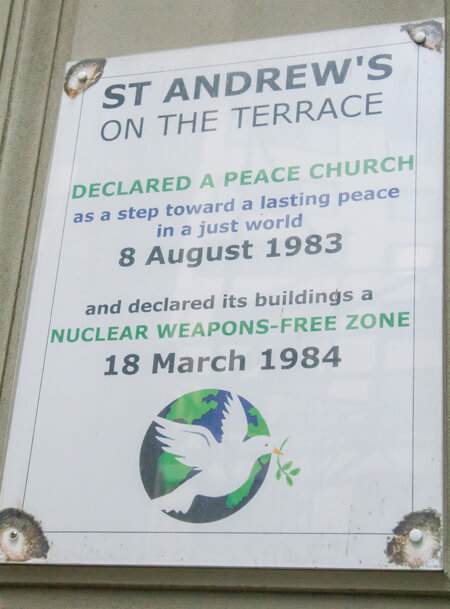In 1983 St Andrew’s on The Terrace declared itself to be a Peace Church as “a step towards lasting peace in a just world”.
Since then we have continued to support initiatives for peace and justice, reducing violence, ending conflict and working for reconciliation.
We are part of Wellington City which was declared a “Peace Capital” in 1993. We work in partnership with Peace Movement Aotearoa, supporting peace vigils and campaigns and regularly hosting lunchtime seminars. In 2015 we co-organised and hosted the national peace workshop “Remembering war / ending war: Challenging militarism and building peace”.

St Andrew’s was declared a peace church in 1984
St Andrew’s has also spearheaded peace initiatives within the wider Presbyterian church.
In 2014, St Andrew’s delivered a proposal regarding peace to General Assembly. The discussion was captured in the following report from Assembly.
Church commits to peace programme
Assembly has agreed to establish a peace-promoting programme called Just Peace. Congregations, church schools and social service agencies with a connection to the Church will be encouraged to establish a programme based on the World Council of Church’s Ecumenical Call to Just Peace 2011.
The recommendation was passed after a first recommendation asking for Assembly to call on political leaders to commit to active initiatives to promote peace through non-violent conflict resolution and to oppose armed conflict failed.
In commending the proposal to Assembly, Paul Barber of St Andrew’s on the Terrace Presbyterian Wellington, said Christians are called to commit to initiatives for peace, such as the Just Peace programme, in this the centenary year marking the outbreak of World War I. Congregations were encouraged to commit to becoming peace churches, to support the work of WCC, CWS, Peace Movement Aotearoa, the Peace Foundation and other peace initiatives.
There was spirited discussion of the two proposals from speakers. The Rev Robyn McPhail linked the proposals to the bicentennial of the Gospel 2014 which she said was significant in “breaking the cycle of violence” between Māori and Pakeha.
Several speakers expressed their support for peaceful resolution of conflict but acknowledged that, when resolution fails, armed response may be necessary. A couple of speakers expressed concern that the first proposal failed to recognise the sacrifice made by Presbyterian chaplains and New Zealand’s soldiers and armed peace-keepers.
www.converge.org.nz/pma